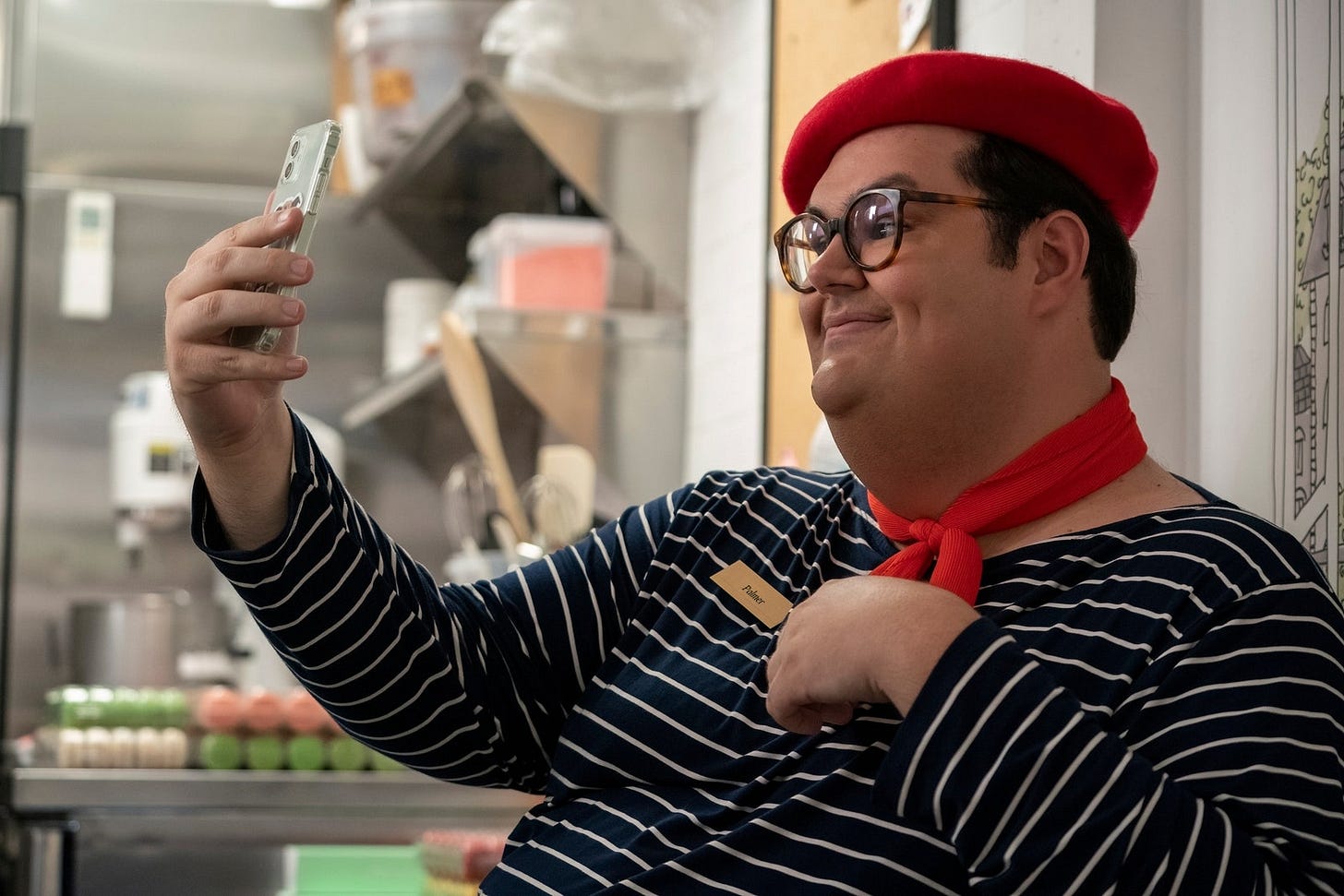Sweethearts is a fine enough rom-com. Starring Nico Hiraga (Ben) and Kiernan Shipka (Jamie) it invokes the question we’ve been asking since 1988––can men and women just be friends? As longtime best pals Ben and Jamie plot to break up with their high school sweethearts throughout one crazy night, they explore this question and themes of finding yourself, independence, and college hookup culture. There are exploding turkeys, awkward clothesless encounters, and someone gets too drunk at a petite soiree. Classic rom-com fodder.
But it’s the third best friend, Palmer’s (Caleb Heron) subplot that’s captured the attention of most viewers. As Ben and Jamie navigate the tricky waters of early college, Palmer has jetted off to Paris for a gap year. Spending his days strolling the Champs-Élysées and working at a cafe outside of Disney Land, he maintains a haughty superiority over his less cultured classmates. This facade crumbles when Palmer runs into Coach Reese (Tramell Tillman) who opens his eyes to a thriving queer community hidden in their small hometown in Ohio. With breakups in the foreground, we watch Palmer come to understand the complexities of queer life.
It’s a lovely sentiment. There are lots of ways to be gay explains Coach Reese under a neon flashing EAT PLAY BOWL sign. His boyfriend, Joel Kim Booster nods along. By the film's end, Palmer is enchanted with Ohio and weary of the “overrated” trappings of Europe. He admits that he regrets his decision to take a year off and ditches the idea altogether in favor of a traditional college experience.
Just below the surface of this feel-good coming-out story is a more contemporary message. Perhaps a more alarming one, too. While we were busy being charmed by the comedic stylings of Caleb Heron, the film’s sending some pretty strong subliminal messages: you don’t need to travel to be fulfilled, stay in Ohio.
Oh no, everybody’s broke.
The hometown is nondescript. Somewhere, Ohio. There’s the BIG FOOTBALL GAME in the afternoon and a packed bar aptly named Duffy’s. Ben and Jamie find themselves at a mansion lakeside party complete with a bonfire and light jacket weather. There’s none of the baron landscape we’d expect from the Midwest. It’s bustling, full of life. The only reason we know it’s Ohio is because the characters keep insisting on it. “My house in LA would cost like five million dollars,” retorts Coach Reese when Palmer pushes back. It’s a tricky sleight of hand. The only difference the film asserts is the price.
Then there’s the Joel Kim Booster of it all. He portrays Coach Reese’s long-term boyfriend. The football team knows about him, Coach Reese brings him to staff meetings. He’s Joel Kim Booster living in Somewhere, Ohio. If you’re not familiar, he’s sort of quintessential LA. He’s a hot, muscley gay guy whose Instagram bio reads “I regret being horny.” There’s nothing wrong with this casting, in fact, it’s sort of genius. This kind of man could live in your hometown too, maybe you just haven’t been queer bowling yet. Unlikely, but sure.
Sweethearts crafts a dream vision of Ohio. Yes, it might be smaller, slower, but somehow still just as good.
While it’s not a bad message, and of course it’s true, you can create community almost anywhere, the film’s insistence that it’s better to just stay home in the first place represents a troubling cultural brokenness. Maybe someone like Palmer would go to France and despise every minute of it. Maybe he would realize he’s better suited at home. But the trying (and, yes, the failing) is one of the most essential parts of coming of age.
The Ohio propaganda seems less of a conservative assertation that small, trad lives are better and more an indicator that these coming-of-age experiences are inaccessible to young people. As rents skyrocket in New York and LA and minimum wage stays stagnant, the idea that you could move out to the big city, couch surf, and find yourself moves further into fantasy land every day.
There are reasons to leave your hometown. It can be freeing to escape to a different place, especially for marginalized young people. You meet new people, find community based on common interests rather than proximity, and cultivate an identity outside of the one given to you in childhood. Sweethearts doesn’t have evil intentions, but it certainly prepares a generation for lowered expectations. Life isn’t what it once was. You might not be able to travel, to see the world, to make it or even make ends meet, but life goes on in Somewhere, Ohio.





